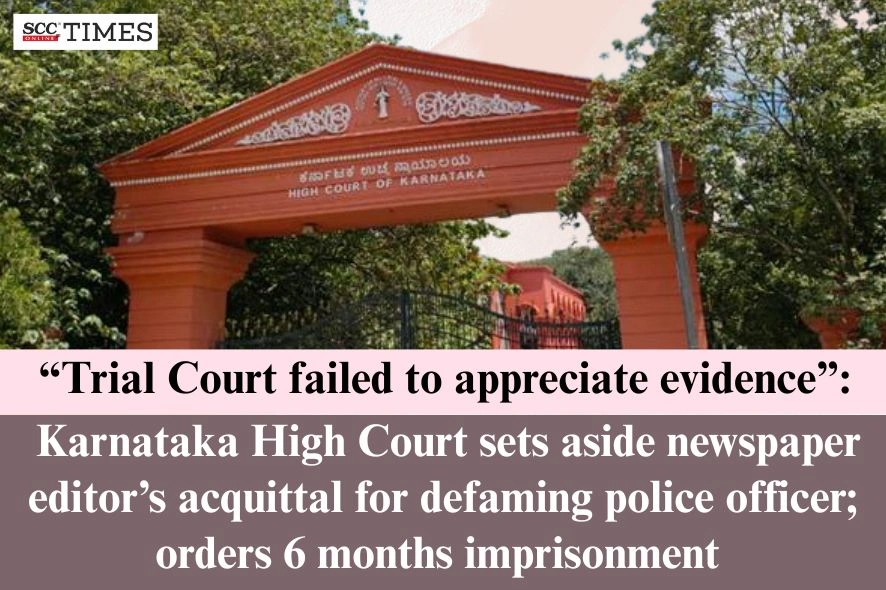Disclaimer: This has been reported after the availability of the order of the Court and not on media reports so as to give an accurate report to our readers.
Karnataka High Court: In an appeal filed by the complainant-appellant, a police officer, under Section 378(4) of the Criminal Procedure Code, 1973 (‘CrPC’) to set aside the judgment passed by the Judicial Magistrate First Class-III acquitting the respondent, editor of Hello Mysore News Paper, for the offence punishable under Sections 500 and 501 of the Penal Code 1860 (‘IPC’), a Single Judge Bench of S Rachaiah, J., held that it is defamatory when an officer is accused of accepting illicit activities in the area where he is assigned, such as allowing prostitution, running a club to play cards, selling adulterated kerosene, playing single-number lottery, etc., and there are no public complaints to substantiate any of these accusations.
The Court held that the Trial Court had failed to appreciate the evidence properly and set aside the impugned order. Further, the Court convicted the respondent of 6 months’ simple imprisonment and imposed a fine of Rs 2,000.
Background
In the present case, the appellant was working as the Circle Inspector of Police and was entrusted with the work of executing the warrant against the respondent. As a part of his official duty, he arrested the respondent and produced him before the Court.
Aggrieved by his arrest, the respondent allegedly published defamatory articles in the Eveninger namely “HELLO MYSORE” stating that, the appellant was receiving bribes and allowing the persons to play single number lottery. Subsequently, certain allegations were made which, according to the appellant, caused damage to his reputation among his family, relatives, and the public.
Therefore, a complaint was registered against the respondent before the Jurisdictional Magistrate. During the trial, the appellant examined himself as a witness, along with three other witnesses, and produced seven documents. After evaluating the evidence, the Trial Court acquitted the respondent.
The appellant argued that the Trial Court adopted an erroneous approach by focusing on whether individual persons had deposed about being affected by the alleged defamatory statements, instead of examining the defamatory publications themselves. Per contra, the respondent contended that the publications were intended merely as a message to an erring officer to improve the system in the public interest and since statements made for public good could not be treated as defamatory.
Analysis and Decision
Considering Section 499 of the IPC, the Court stated that if any statements are published or spoken any imputation concerning any person intending to harm or knowing or having reason to believe that such imputation will harm the reputation of such person, it is said that, it is expected to defame that person.
In the present case, the Court noted that the appellant had discharged his duties efficiently and without any adverse remarks. Despite this, the respondent’s newspaper carried allegations accusing him of accepting bribes, permitting illegal single number of lottery operations, and unlawfully collecting money from parking agents. Further, publications alleged that illegal activities such as gambling clubs, prostitution, and the sale of adulterated kerosene were being ran under the appellant’s protection.
The Court emphasized that it is well settled that once a publication is proved to be defamatory in nature, the burden shifts to the publisher to establish that the statements were made in the public interest. In this case, the respondent failed to furnish any evidence, such as public complaints or supporting material, to substantiate the grave allegations levelled against the police officer and the Trial Court failed to appreciate the evidence properly.
The Court opined that the respondent had published the words or statements in his newspaper which harmed the reputation of the appellant and held that making baseless accusations intended to damage the dignity of an individual unquestionably constituted defamation.
Hence, the Court allowed the petition and set aside the impugned order. Further, the Court convicted the respondent for the offence punishable under Sections 500 and 501 of the IPC and ordered him to undergo simple imprisonment for a period of six months and to pay a fine of Rs 2,000 concurrently for both offences.
[S. N. Suresh Babu v. T. Gururaj, 2025 SCC OnLine Kar 20843, decided on 3-11-2025]
Advocates who appeared in this case:
For the Appellant: Chethan B., Advocate, and Syed Amjad, Advocate
For the Respondent: Shankarappa, Advocate




